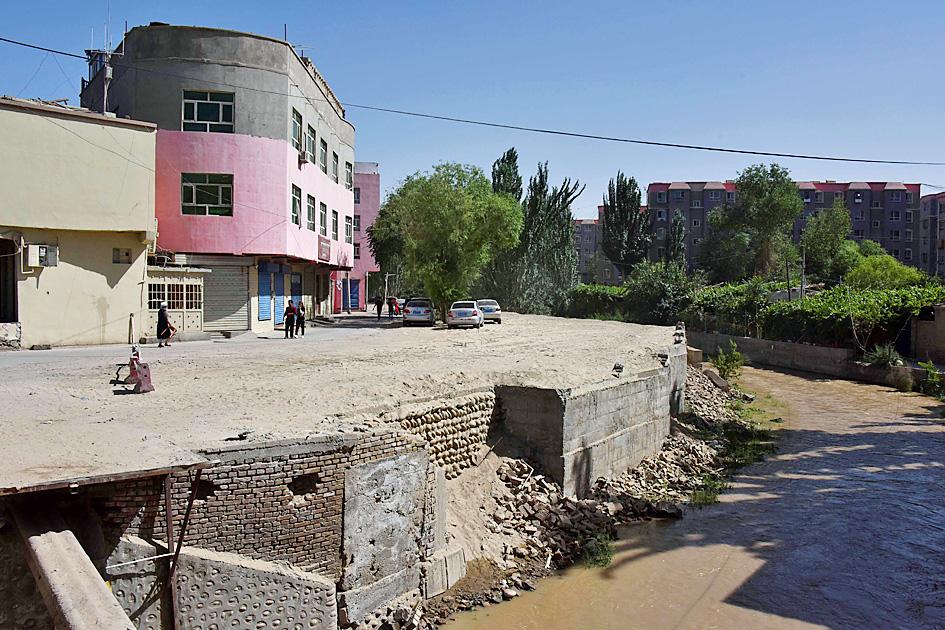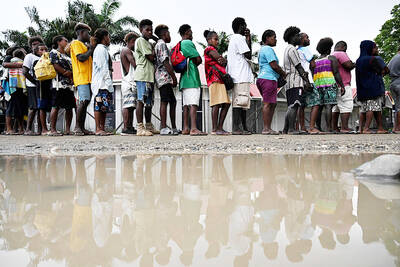Chinese authorities have demolished thousands of mosques in Xinjiang, an Australian think tank said yesterday, in the latest report of widespread human rights abuses in the restive region.
Rights groups say that more than 1 million Uighurs and other mostly Muslim Turkic-speaking people have been incarcerated in camps across the northwestern territory, with residents pressured to give up traditional and religious activities.
About 16,000 mosques had been destroyed or damaged, according to an Australian Strategic Policy Institute (ASPI) report based on satellite imagery documenting hundreds of sacred sites and statistical modelling.

Photo: AFP
Most of the destruction had taken place in the past three years and an estimated 8,500 mosques had been completely destroyed, the report said, with more damage outside the urban centers of Urumqi and Kashgar.
Many mosques that escaped demolition had their domes and minarets removed, according to the research, which estimated that fewer than 15,500 intact and damaged mosques were left standing around Xinjiang.
If correct, it would be the lowest number of Muslim houses of worship in the region since the decade of national upheaval sparked by the Cultural Revolution in the 1960s.
By contrast, none of the Christian churches and Buddhist temples in Xinjiang that were studied by the think tank had been damaged or destroyed.
ASPI also said that nearly a third of major Islamic sacred sites in Xinjiang — including shrines, cemeteries and pilgrimage routes — had been razed.
An Agence France-Presse investigation last year found that dozens of cemeteries had been destroyed in the region, leaving human remains and bricks from broken tombs scattered across the land.
China has said that residents of Xinjiang have religious freedom.
Asked about the research, the Chinese Ministry of Foreign Affairs said that the research institute had “no academic credibility” and was producing “anti-China reports and anti-China lies.”
Ministry spokesman Wang Wenbin (汪文斌) said that there were about 24,000 mosques in the region.
“Xinjiang’s total number of mosques is more than ten times the number in the US, and the average number of mosques per Muslim person is higher than in some Muslim countries,” Wang told a regular news briefing.
The report comes a day after ASPI said it had identified a network of detention centers in the region much larger than previous estimates.
Beijing has said that its network of camps are vocational training centers, which are necessary for countering poverty and anti-extremism.

SEEKING CHANGE: A hospital worker said she did not vote in previous elections, but ‘now I can see that maybe my vote can change the system and the country’ Voting closed yesterday across the Solomon Islands in the south Pacific nation’s first general election since the government switched diplomatic allegiance from Taiwan to Beijing and struck a secret security pact that has raised fears of the Chinese navy gaining a foothold in the region. The Solomon Islands’ closer relationship with China and a troubled domestic economy weighed on voters’ minds as they cast their ballots. As many as 420,000 registered voters had their say across 50 national seats. For the first time, the national vote also coincided with elections for eight of the 10 local governments. Esther Maeluma cast her vote in the
Nearly half of China’s major cities are suffering “moderate to severe” levels of subsidence, putting millions of people at risk of flooding, especially as sea levels rise, according to a study of nationwide satellite data released yesterday. The authors of the paper, published by the journal Science, found that 45 percent of China’s urban land was sinking faster than 3mm per year, with 16 percent at more than 10mm per year, driven not only by declining water tables, but also the sheer weight of the built environment. With China’s urban population already in excess of 900 million people, “even a small portion

UNSETTLING IMAGES: The scene took place in front of TV crews covering the Trump trial, with a CNN anchor calling it an ‘emotional and unbelievably disturbing moment’ A man who doused himself in an accelerant and set himself on fire outside the courthouse where former US president Donald Trump is on trial has died, police said yesterday. The New York City Police Department (NYPD) said the man was declared dead by staff at an area hospital. The man was in Collect Pond Park at about 1:30pm on Friday when he took out pamphlets espousing conspiracy theories, tossed them around, then doused himself in an accelerant and set himself on fire, officials and witnesses said. A large number of police officers were nearby when it happened. Some officers and bystanders rushed

HYPOCRISY? The Chinese Ministry of Foreign Affairs yesterday asked whether Biden was talking about China or the US when he used the word ‘xenophobic’ US President Joe Biden on Wednesday called for a hike in steel tariffs on China, accusing Beijing of cheating as he spoke at a campaign event in Pennsylvania. Biden accused China of xenophobia, too, in a speech to union members in Pittsburgh. “They’re not competing, they’re cheating. They’re cheating and we’ve seen the damage here in America,” Biden said. Chinese steel companies “don’t need to worry about making a profit because the Chinese government is subsidizing them so heavily,” he said. Biden said he had called for the US Trade Representative to triple the tariff rates for Chinese steel and aluminum if Beijing was